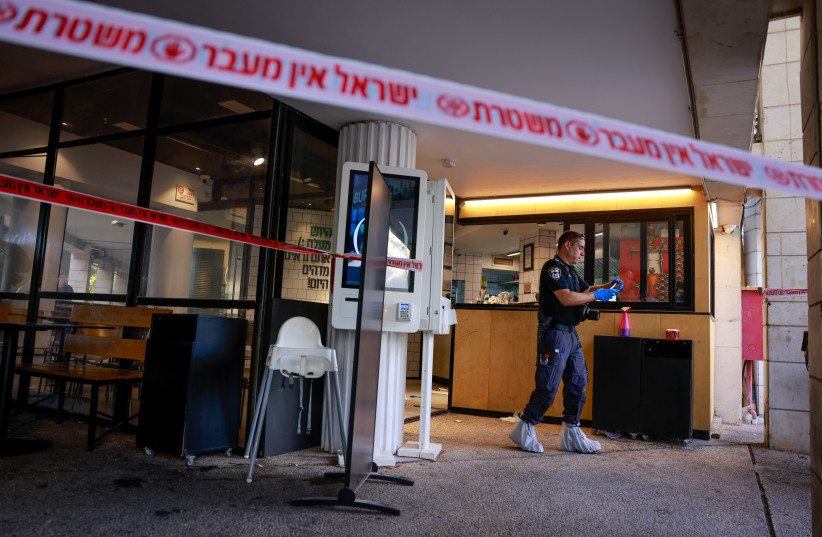The usually languid atmosphere of Ma’aleh Adumim was shattered on Tuesday when a Palestinian employee of the local community center opened fire in the city center, wounding six people before being killed by an off-duty Border Police officer.
The terrorist, Muhannad Muhammad Suleiman al-Mazara’a, was from Eizariya, a Palestinian town neighboring Ma’aleh Adumim, and was one of some 7,000 Palestinians employed in Ma’aleh Adumim and its nearby industrial area, Mishor Adumim.
Mazara’a had just begun working at the community center, where his father has been working for some 20 years. On the day of the attack, Mazara’a said he was sick, got a ride to the entrance to Eizariya, and then returned to Ma’aleh Adumim an hour later with a gun.
Security forces are investigating how Mazara’a was able to get past the usually stringent security checks at the entrance to Ma’aleh Adumim. All work permits for Palestinians to enter the city were suspended for the day after the attack, Mayor Benny Kashriel announced.
In addition to those measured and sound responses, however, there also have been calls for more extreme measures and changes in policy regarding Palestinian workers in Israel.

Israeli lawmakers call to change policy for Palestinian workers
Likud MK Avichay Buaron accused the commander of IDF Central Command, Maj.-Gen. Yehuda Fuchs, of placing Palestinians’ freedom of movement in the West Bank above the well-being of Israelis.
“Allowing movement rights for Palestinians is more important than hermetically protecting Israelis,” Buaron charged soon after the Ma’aleh Adumim attack, adding that Fuchs’s policies were undermining the country’s top priority of fighting terrorism.
The comments were immediately condemned by both IDF Chief of Staff Lt.-Gen. Herzi Halevi and Defense Minister Yoav Gallant, who tweeted: “Maj.-Gen. Yehuda Fuchs is a professional officer [who] dedicates his life to the defense of the people of Israel.”
Halevi said: “Any attack on IDF officers by public figures undermines Israel’s security. Under his command, the commanders and soldiers work day and night to ensure the safety of all residents of the West Bank. Any statement that impugns his considerations and his commitment to the security of Israel’s citizens has no merit and deserves all condemnation.”
Even Prime Minister Benjamin Netanyahu distanced himself from his backbencher Likud colleague, saying: “The denigration of Maj.-Gen. [Yehuda] Fuchs is unacceptable and unworthy.”
Buaron’s attack on the IDF is consistent with the view of some on the Right who have criticized Israel’s provision of work permits to Palestinians, and they crop up whenever a terrorist attack is perpetrated by a Palestinian with such a permit.
That view ignores the reality that thousands of Palestinians enter Israel, inside and outside the Green Line, every day without incident. In recent years, statistically speaking, the percentage of terrorist attacks by Palestinians with work permits has been close to zero.
According to the latest figures, some 220,000 Palestinians work for Israeli employers in Israel and the West Bank. There is a minimum cutoff age of 27 for permits, because at that point, according to the Shin Bet (Israel Security Agency), the risk of terrorism drops. The last attack inside Ma’aleh Adumim occurred in 2016.
As Yonah Jeremy Bob wrote in Wednesday’s Post, both defense and government officials have been weighing the issue of permits for years. Most security officials subscribe to the idea that the number of permits given should actually be increased, because the more economically secure the Palestinians feel, the less likely they are to commit acts of terrorism.
Others worry that all that is required for a terrorist attack to take place are a few “bad apples,” that criteria for permits are too lenient, and that the threat is too great.
After Wednesday’s attack in Ma’aleh Adumim, there will undoubtedly be more pressure from some to reduce the number of work permits. But cooler heads should prevail.
The screening procedures for work permits are effective and enable thousands of Palestinians to provide for their families. Besides relying on this workforce, it is in Israel’s interest to provide Palestinians in the West Bank with job opportunities so long as a permanent solution to the disputed territories remains elusive.
Israeli decision-makers must constantly weigh these considerations against their sacred responsibility to keep Israelis safe. One terrorist attack, however, need not cause a rethink of a policy that works.
